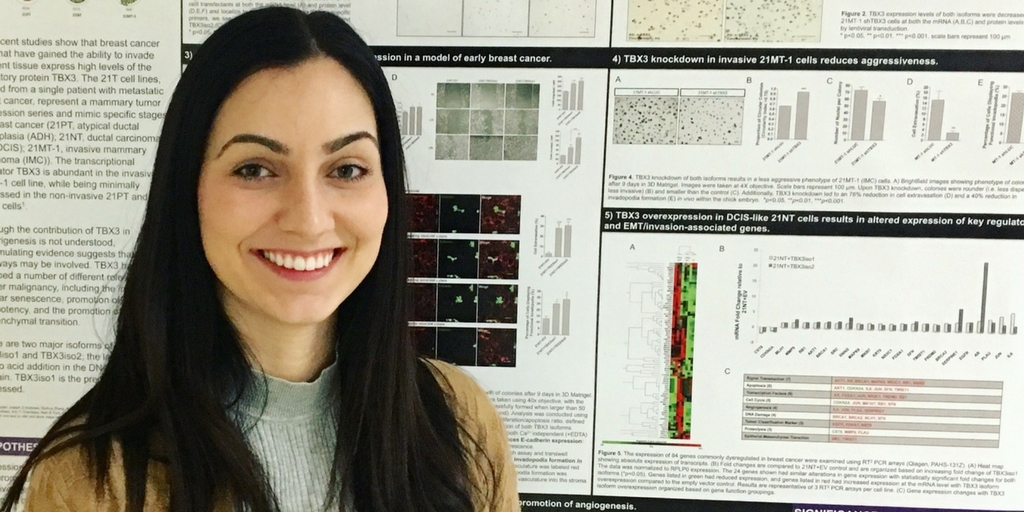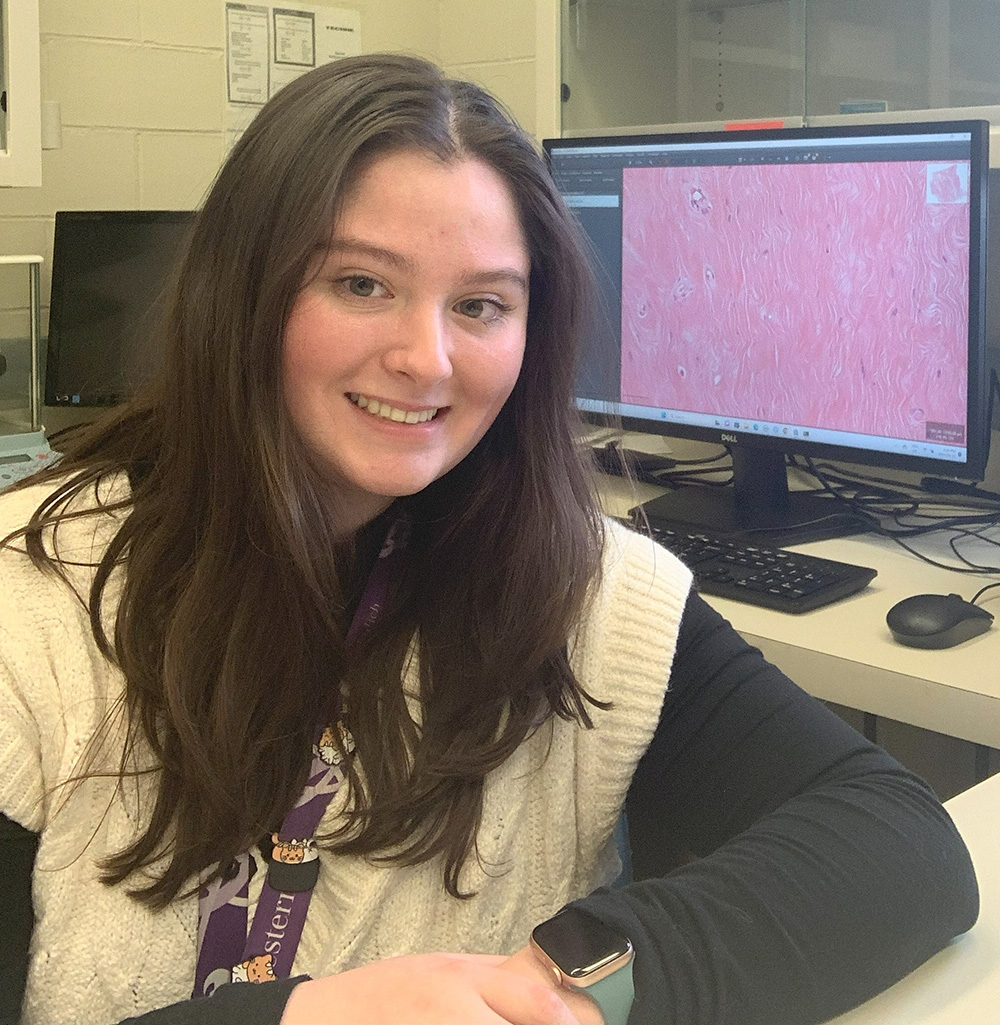 When asked about the top skills needed to be a successful researcher in her field, Milica Krstic lists them as follows, “Being creative and coming up with interesting and creative research questions is very important. You should read the latest papers and be able to make connections with how you can apply that in your own research.”
When asked about the top skills needed to be a successful researcher in her field, Milica Krstic lists them as follows, “Being creative and coming up with interesting and creative research questions is very important. You should read the latest papers and be able to make connections with how you can apply that in your own research.”
Milica Krstic works at the London Regional Cancer Program under the supervision of Drs. Ann Chambers and Alan Tuck. She is pursuing her PhD in the Department of Pathology and Laboratory Medicine at Western University. Milica has been studying transcriptional regulation in early breast cancer throughout her PhD studies.
Thinking back on the starting point of her research, Milica says she enjoyed working in areas related to molecular biology and biochemistry during her undergraduate degree at the University of Windsor. When it came time to choose what to study further, it was Dr. Ann Chambers who influenced Milica’s decision to enter the breast cancer field. “As an undergrad, I was aware that a lot of different areas exist within cancer research. Meeting Dr. Chambers, a distinguished oncology scientist, and learning about the kind of work that her lab is conducting influenced me to pursue breast cancer research specifically. I really liked her use of experimental animal models and the clinical focus of her work.”
Milica has been studying a transcription factor called TBX3 in the early stages of breast cancer. This protein is believed to promote malignancy of tumor cells. “We know that TBX3 levels are elevated in several types of cancer, but its role in breast cancer progression is not well understood. We are looking at the underlying mechanism and trying to elucidate how that happens and whether these events are clinically relevant.”
Milica’s research suggest that TBX3 promotes progression of early-stage breast cancer, and Milica underlines that this is a big clinical problem. Ductal carcinoma in situ (DCIS) is a very early stage of breast cancer in which some cells of the breast have become cancerous, but have not invaded the surrounding breast tissue. “Unfortunately, lots of patients progress with DCIS preinvasive lesions. Women with DCIS have a 10-times-higher risk for developing invasive cancer than women without a history of DCIS.”
Milica has done a lot of genomics work to look at the targets of TBX3. She hopes to find something that can be used to predict the probability of breast cancer advancement from Stage 0 (when cancer cells remain within their original location) to Stage I: “We are trying to find out those molecular changes that occur when breast cancer goes from the non-invasive to invasive stage. TBX3 can be thought of as a ‘master regulator’ influencing gene expression within a cancer cell. If we understand the way TBX3 promotes cancer progression through these transcriptional changes, it allows us to stratify patients into risk groups and treat these patients accordingly.”
Approximately 16% of patients with low grade DCIS and about 60% with the high grade will progress to invasive cancer, but these patients are all receiving identical treatment. “Lots of studies have reported that several patients with early breast cancer are actually over-treated. They are going through difficult, invasive and expensive treatment they don’t need. If we succeed with our research, there will be the possibility to treat those patients who really need the therapy and prevent them from progressing to deadly cancers.”
During the experimental part of her research, Milica has worked with two variants of TBX3. “These are two different isoforms. Before I started the experiments, there was no knowledge of any differences between these two variants. In fact, there is a drastic difference between them that can be directly linked to functional differences, and has been validated using clinical patient data as well. I hope that in about six months the results of my experiments will be published.”
“I have faced a lot of challenges over the past couple of years. The end of the PhD is the hardest stage. The experiments that I do need to be very critically thought out. Everything needs to have a purpose, so I can tie up all of the loose ends. I am currently focusing on publishing the multiple stories I’ve been working on throughout my studies. The excellent thing about research is that the deeper you dive into the topic, the more research questions arise that encourage me to go further, the more exciting the story gets.”
Support researchers like Milica Krstic and others by considering a donation to the Breast Cancer Society of Canada. Find out how you can help fund life-saving research, visit bcsc.ca/donate
Milica Krstic’s story was transcribed from interviews conducted by BCSC volunteer Natalia Mukhina – Health journalist, reporter and cancer research advocate
 Natalia Mukhina, MA in Health Studies, is a health journalist, reporter and cancer research advocate with a special focus on breast cancer. She is blogging on the up-to-date diagnostic and treatment opportunities, pharmaceutical developments, clinical trials, research methods, and medical advancements in breast cancer. Natalia participated in numerous breast cancer conferences including 18th Patient Advocate Program at 38th San Antonio Breast Cancer Symposium. She is a member of The Association of Health Care Journalists.
Natalia Mukhina, MA in Health Studies, is a health journalist, reporter and cancer research advocate with a special focus on breast cancer. She is blogging on the up-to-date diagnostic and treatment opportunities, pharmaceutical developments, clinical trials, research methods, and medical advancements in breast cancer. Natalia participated in numerous breast cancer conferences including 18th Patient Advocate Program at 38th San Antonio Breast Cancer Symposium. She is a member of The Association of Health Care Journalists.




